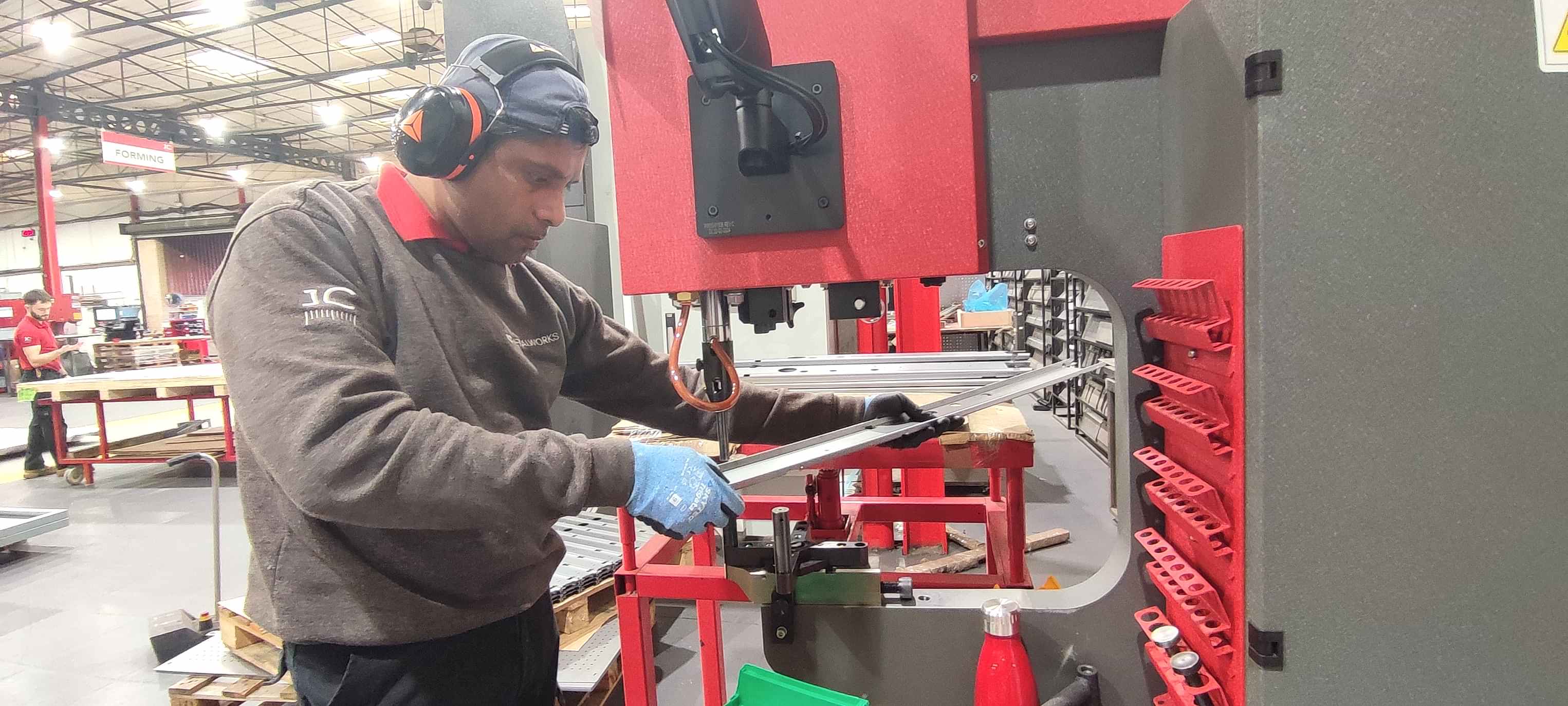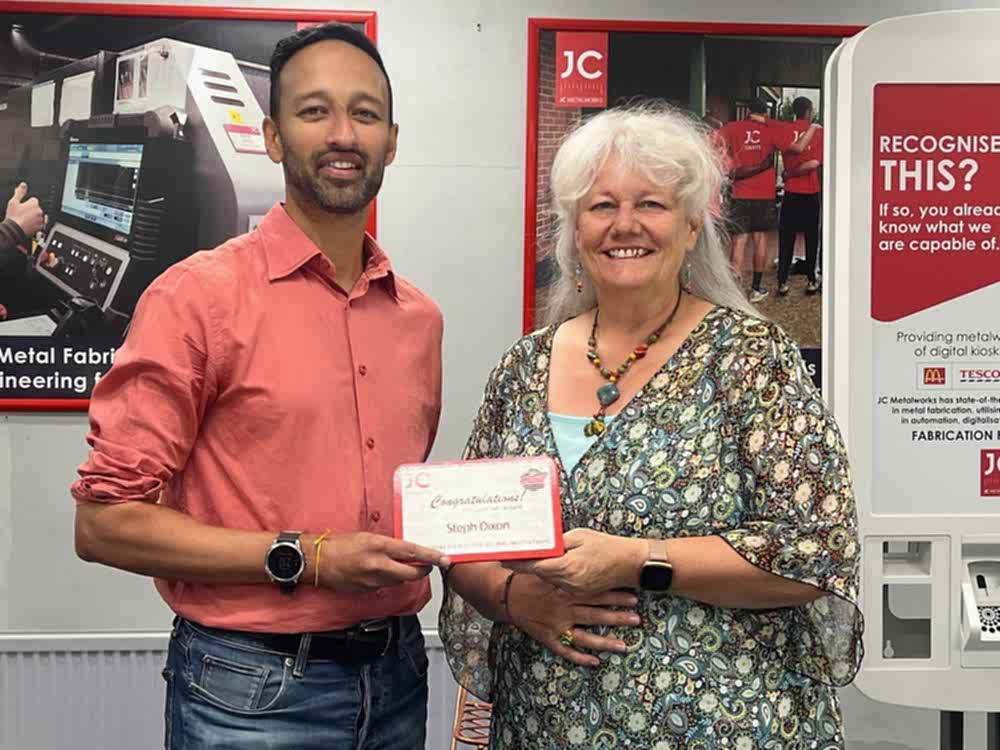Optimising Sheet Metal Fabrication: Reducing Welding Through Advanced Forming and Fastening Techniques
In modern sheet metal design, reducing welding operations is a key objective—not only for cost efficiency but also for improving part performance, surface quality, and production throughput. At JC Metalworks, a specialist metal fabrication company in the UK, we harness advanced metal fabrication services and design-for-manufacture principles to strategically minimise welding, particularly in complex or hard-to-access assemblies.
Our engineers combine value engineering analysis, intelligent forming techniques, and smart fastening systems to deliver both performance and manufacturability. The result is a streamlined, scalable, and visually clean solution, with enhanced structural integrity and reduced post-processing.

Advanced Forming Techniques to Eliminate Welding
Modern forming processes enable significant structural complexity and mechanical functionality without introducing thermal stresses. At JC Metalworks, our metal fabrication services include CNC press braking, multi-stage forming, and hemming, which allow us to produce intricate parts that fit together with precision—no welds required.
Our design engineering team conducts value engineering analysis at the concept stage to identify how features such as:
- Self-locating tabs
- Burr-free interlocks
- Reinforced folded flanges
- Radius-based stress dispersal zones
can be introduced directly through forming. These features not only improve ease of assembly but also significantly reduce reliance on welds—critical in applications requiring dimensional stability, corrosion resistance, or visible finishes.
Additionally, prototyping and first-article inspection allow us to validate formability and fit early in the project lifecycle, enabling clients to iterate before committing to full production. This phase helps us identify potential issues such as:
- Overstressed corners
- Springback misalignments
- Tooling clashes
- Unintended interference between mating parts
By addressing these in the design-for-fabrication stage, we dramatically reduce rework, lead time, and downstream failures.

Key Advantages of Welding Reduction via Forming:
- Cost-effective manufacturing: Fewer labour hours, reduced filler materials, and lower energy costs
- Improved geometric consistency: No warping or heat-affected zones
- Faster production cycles: No grinding, cleaning, or rework on weld seams
- Superior finish quality: Especially valuable for external-facing parts and powder-coated surfaces
- Better material performance: Particularly in lightweight or corrosion-resistant alloys like aluminium or stainless steel

Fastening Techniques: Screws, Nut Insertions, and PEM Fasteners
In designs where welding is not feasible—due to accessibility constraints, thermal limitations, or aesthetic requirements—mechanical fastening becomes a key alternative. Our metal fabrication services include expert selection and integration of fastening systems, such as:
- PEM self-clinching nuts
- Captive fasteners
- Threaded inserts
- Self-tapping and machine screws
These are often added during or immediately after forming, before powder coating or surface finishing. This integrated workflow ensures tight tolerances, reduced risk of misalignment, and full mechanical engagement even in narrow or concealed assemblies.
Technical benefits include:
- Disassembly for servicing or upgrades
- No heat distortion on sensitive surfaces
- No additional shielding or fixturing needed during assembly
- Consistent clamping torque and thread integrity

Design-Led Approach with Value Engineering
Our position as a high-performance metal fabrication company in the UK is rooted in our collaborative design process. With each project, we apply a value engineering mindset to identify:
- Components that can be combined or eliminated through rethinking forming strategy
- Joints that can shift from welded to folded or mechanically fastened
- Finishing steps that can be consolidated by reducing weld seams and grinding
We work closely with OEMs, industrial designers, and procurement teams during the prototyping and pre-production phases to ensure designs are scalable, cost-effective, and aligned with manufacturing constraints.
By fusing technical design excellence with modern fabrication techniques, JC Metalworks consistently delivers fabrication-ready components that meet demanding specifications without compromise.
Our approach empowers clients to:
- Reduce time-to-market
- Lower total cost of ownership
- Improve performance in real-world environments
- Ensure consistent quality across production volumes
Ready to Optimise Your Next Project?
With over 35 years of experience in metal fabrication services, JC Metalworks has developed a proven track record of delivering high-performance, cost-effective solutions for even the most complex designs. Whether you’re in the early stages of development or looking to optimise an existing assembly, our expert team is ready to support you with advanced forming, fastening, and design-for-manufacture strategies.
Partner with a trusted metal fabrication company in the UK—get in touch with JC Metalworks today to discuss how we can reduce welding, enhance finish quality, and accelerate your production timeline.
➡️ Contact us now to schedule a consultation or request a prototype review.
Here are three reputable external references you can link to that provide valuable insights into metal fabrication, forming techniques, fastening alternatives to welding, and value engineering:
The Fabricator – Benefits of Reducing Welding in Sheet Metal Fabrication
(Discusses cost savings, quality improvements, and alternatives to welding)PEM Fasteners – Advantages of Mechanical Fastening vs. Welding
(Explores how fasteners like PEM nuts reduce welding and improve assembly)SME – Value Engineering for Metal Fabrication and Manufacturing
(Explains value engineering principles and applications in manufacturing)





